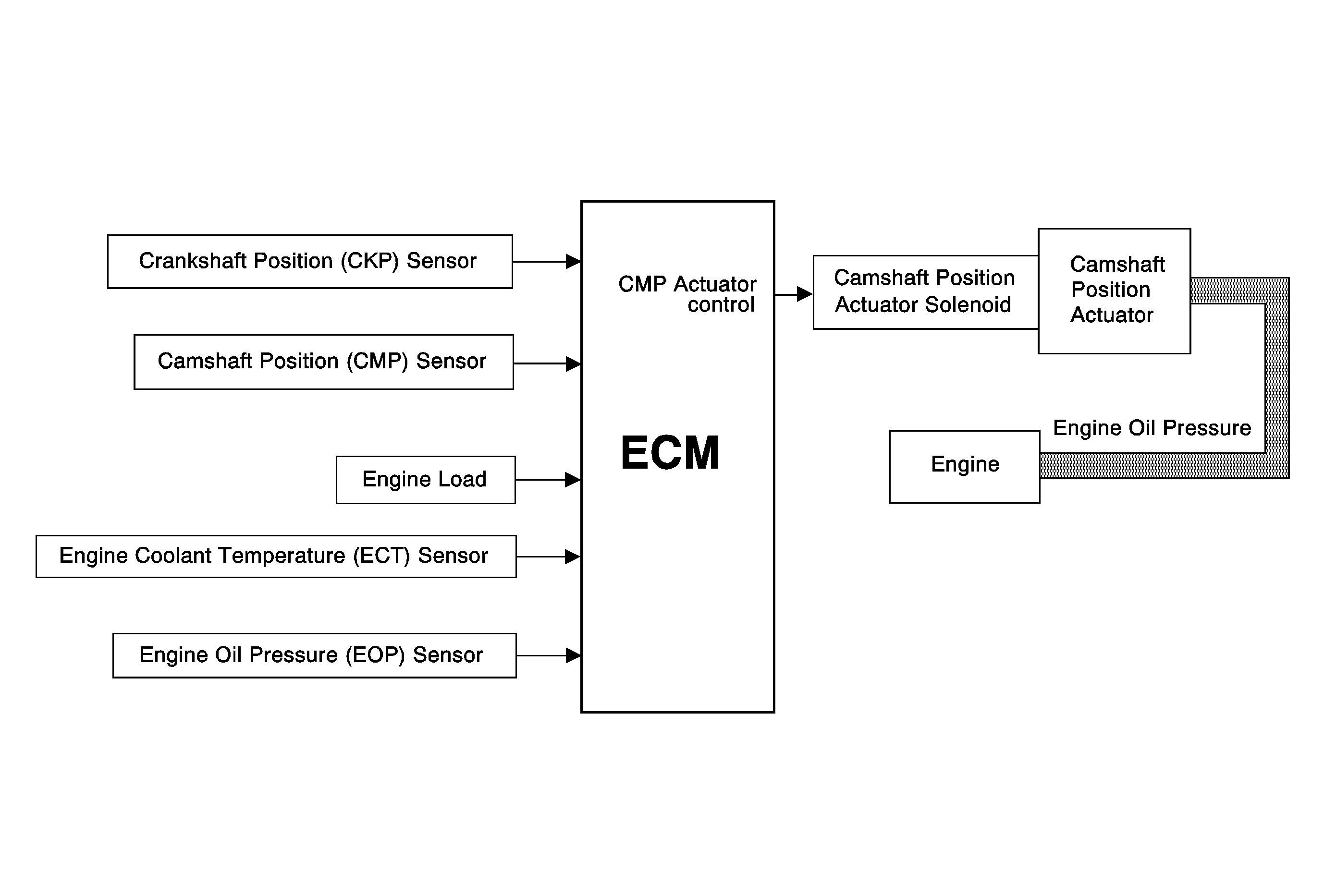
Camshaft Position (CMP) Actuator System
The camshaft position (CMP) actuator system is an electro-hydraulic operated device used for a variety of engine performance and operational enhancements. These enhancements include lower emission output through exhaust gas dilution of the intake charge in the combustion chamber, a broader engine torque range, and improved fuel economy. The CMP actuator system accomplishes this by changing the angle or timing of the camshaft relative to the crankshaft position. The CMP actuator simply allows earlier or later intake and exhaust valve opening during the four stroke engine cycle. The CMP actuator cannot vary the duration of valve opening, or the valve lift.
During engine OFF, engine idling conditions, and engine shutdown, the camshaft actuator is held in the park position. Internal to the CMP actuator assembly is a return spring and a locking pin. During non-phasing modes of the camshaft, the return spring rotates the camshaft back to the park position, and the locking pin retains the CMP actuator sprocket to the camshaft. The park position for the CMP actuator and camshaft is 8.5 degrees before top dead center (BTDC), which is equal to 17 crankshaft degrees BTDC. The engine control module (ECM) can only command the CMP actuator to retard the valve timing from the park position, or advance the valve timing back to the park position. The total range of valve timing authority is approximately 20 degrees of camshaft rotation, which is equal to 40 degrees of crankshaft rotation.
CMP Actuator System Operation
The camshaft position (CMP) actuator system is controlled by the engine control module (ECM). The ECM sends a pulse width modulated 12-volt signal to a CMP actuator solenoid to control the amount of pressurized engine oil, into the CMP actuator. To regulate the pressurized engine oil into the CMP actuator, the solenoid uses electromagnetic force on the solenoid pintle to pulse the oil control spool valve. The pressurized engine oil is sent to unseat the locking pin, and to the vane and rotor assembly of the CMP actuator, to either retard or advance the valve timing. The ECM will control the amount of ON time applied to the solenoid.

Camshaft Position (CMP) Actuator System
The camshaft position (CMP) actuator system is an electro-hydraulic operated device used for a variety of engine performance and operational enhancements. These enhancements include lower emission output through exhaust gas dilution of the intake charge in the combustion chamber, a broader engine torque range, and improved fuel economy. The CMP actuator system accomplishes this by changing the angle or timing of the camshaft relative to the crankshaft position. The CMP actuator simply allows earlier or later intake and exhaust valve opening during the four stroke engine cycle. The CMP actuator cannot vary the duration of valve opening, or the valve lift.
During engine OFF, engine idling conditions, and engine shutdown, the camshaft actuator is held in the park position. Internal to the CMP actuator assembly is a return spring and a locking pin. During non-phasing modes of the camshaft, the return spring rotates the camshaft back to the park position, and the locking pin retains the CMP actuator sprocket to the camshaft. The park position for the CMP actuator and camshaft is 8.5 degrees before top dead center (BTDC), which is equal to 17 crankshaft degrees BTDC. The engine control module (ECM) can only command the CMP actuator to retard the valve timing from the park position, or advance the valve timing back to the park position. The total range of valve timing authority is approximately 20 degrees of camshaft rotation, which is equal to 40 degrees of crankshaft rotation.
CMP Actuator System Operation
The camshaft position (CMP) actuator system is controlled by the engine control module (ECM). The ECM sends a pulse width modulated 12-volt signal to a CMP actuator solenoid to control the amount of pressurized engine oil, into the CMP actuator. To regulate the pressurized engine oil into the CMP actuator, the solenoid uses electromagnetic force on the solenoid pintle to pulse the oil control spool valve. The pressurized engine oil is sent to unseat the locking pin, and to the vane and rotor assembly of the CMP actuator, to either retard or advance the valve timing. The ECM will control the amount of ON time applied to the solenoid.
